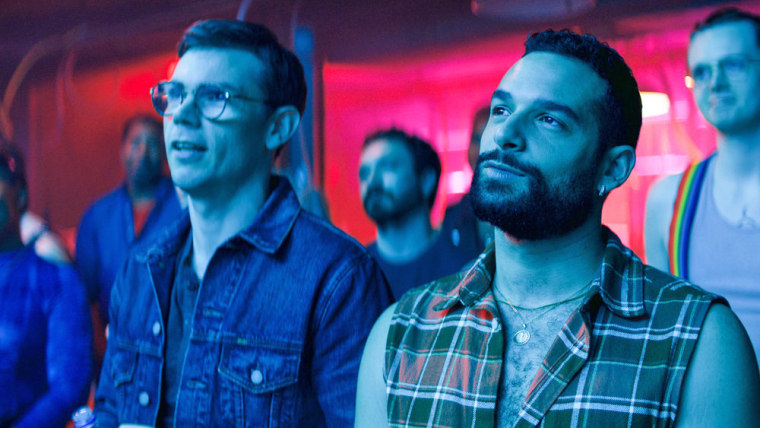More than two decades after the Welsh screenwriter Russell T. Davies created a pioneering British television drama that chronicled the lives of three gay men living in Manchester, England, “Queer as Folk” has been reimagined for a new generation on Peacock, the streaming network owned by NBC Universal, the parent company of NBC News.
But this time, the latest iteration — which comes nearly 17 years after an acclaimed American adaptation, centering on a group of gay friends in Pittsburgh, ended on Showtime — is looking to tackle contemporary concerns by painting a more nuanced picture of the LGBTQ community.
Created by Stephen Dunn, the new “Queer as Folk,” which premiered Thursday, follows a diverse group of friends whose lives are upended in the aftermath of a mass shooting at Babylon, a fictional gay bar in New Orleans. The tragedy, which is reminiscent of the 2016 Pulse nightclub massacre in Orlando, Florida, was the basis of the initial pitch that convinced Davies to give Dunn the rights to the prestigious property around five years ago.
“There’s no community that is more fractured, more sprawling, and that has so much division, but I told Russell that the last time I remembered the queer community really coming together was after the Pulse nightclub shooting,” Dunn, 33, said in an interview provided to the press. “It was something where everyone was affected and unified by this horrible tragedy in such a way that it felt like a story about a community rebuilding could be the premise for a show.”
The eight-episode season begins with the fateful homecoming of Brodie (Devin Way), a charming, hot-tempered young gay man who decides to visit his adoptive mother, Brenda (Kim Cattrall), and disabled brother, Julian (Ryan O’Connell), after dropping out of medical school. Brodie is also the soon-to-be biological father of twins, having donated his sperm to his trans best friend, Ruthie (Jesse James Keitel), and her nonbinary partner, Shar (CG). After taking a bullet for Mingus (Fin Argus), an aspiring teen drag performer raised by a supportive single mother (Juliette Lewis), and losing a close friend in the shooting, Brodie decides to move back in with his former fiancé, Noah (Johnny Sibilly), a successful lawyer who is not as put together as he seems.
For Dunn, who grew up secretly watching the American adaptation as a young adult in Canada, reimagining “Queer as Folk” — with Davies attached as an executive producer — meant there was an inherent responsibility to not only honor the original source material but to also carve out space for members of the LGBTQ community who have been historically overlooked on television.
“We need to re-examine what the word ‘queer’ means now, because I think it has evolved and changed a lot in terms of the way that we look at it” since the early 2000s, he told NBC News.
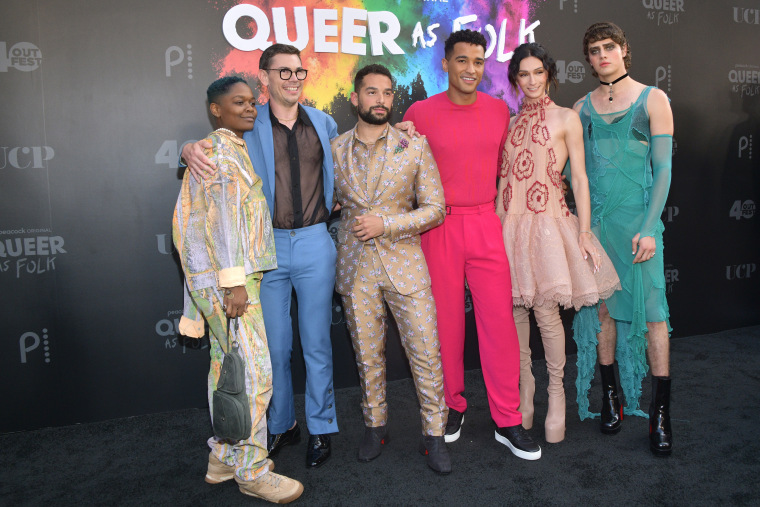
Keitel, who is best known for playing one of network TV’s first nonbinary characters on ABC’s “Big Sky,” said LGBTQ audiences “are tired of not seeing themselves reflected” and “expect more from the representation” they do see.
“What I think is really cool about our show is, there are stories that I don’t think have ever been told on TV before,” Keitel said. “There are not a lot of trans women on television, especially not in roles that allow them to consistently make mistakes and allow them to be a sexual being.”
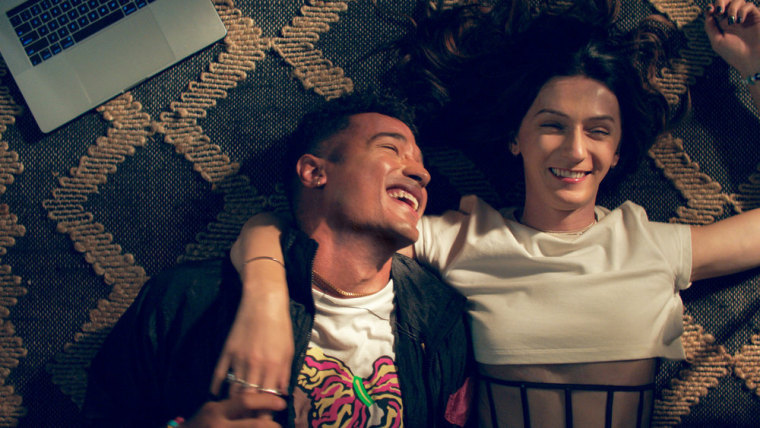
As a result of “the harm that Hollywood has done to queer characters in the past,” Dunn said, “there’s been an urge to correct that by creating role models and saintly like depictions of queer characters.”
“It’s rare for queer characters to be able to show that authentic, flawed, messy side, because I think there’s a fear of offending people by showing that side,” he said. “It’s hard for people from outside the community to be able to tell whether or not this is going to be offensive or if it’s going to be authentic, and I think the benefit of having an all-queer writers’ room or cast is that we are approaching this from a perspective of love and wanting to tell stories with authenticity, not just to be obnoxious or provocative.”
Though he didn’t set out to create a show where everyone on both sides of the camera “has to be queer,” Dunn said he believes it is vital “to encourage authentic queer storytelling by casting and hiring real, actual queer people with these real lived experiences that they can contribute.”
Keitel was the first series regular to be cast last summer. Having watched “a little bit” of the American version while in college, Keitel said it was the prospect of playing a “multidimensional, complicated” trans woman that immediately appealed to her.
“Ruthie has a line in the first episode that I absolutely adore: ‘Hey, you can be trans and toxic. It’s called intersectionality, b----!’ That’s a big reason why I wanted to do this show. These are queer people who are given the chance to be human,” Keitel said. “I see so much of myself in Ruthie, and I think a lot of viewers will see through her mistakes, see through her triumphs and go, ‘I’ve been there.’ She’s less of an adult than she wants to be, and her arc is her finally trying to get there — and maybe fumbling it again.”
Once he decided that a nightclub shooting would be the inciting incident in the pilot, Dunn flew to Orlando to meet with community leaders and survivors of the Pulse massacre in an attempt to gain a deeper understanding of how they each responded to the tragedy. When the series was officially picked up last April, Dunn said he reached out to many of the same people who served as consultants and read scripts “to make sure we were getting it right.”
And while the writers and actors did not want to shy away from the issues that continue to plague the community — such as the exploitation of queer trauma, lingering fears of being HIV-positive, violence against trans and nonbinary people — they also wanted to capture the joy of rebuilding a vibrant community in a queer mecca like New Orleans.
“We really, honestly need these kinds of stories more than ever, because of the realities that we face as queer people,” Dunn said. “I think humor and joy is not just a luxury — it’s a survival tool for a lot of us. It certainly was for me.”
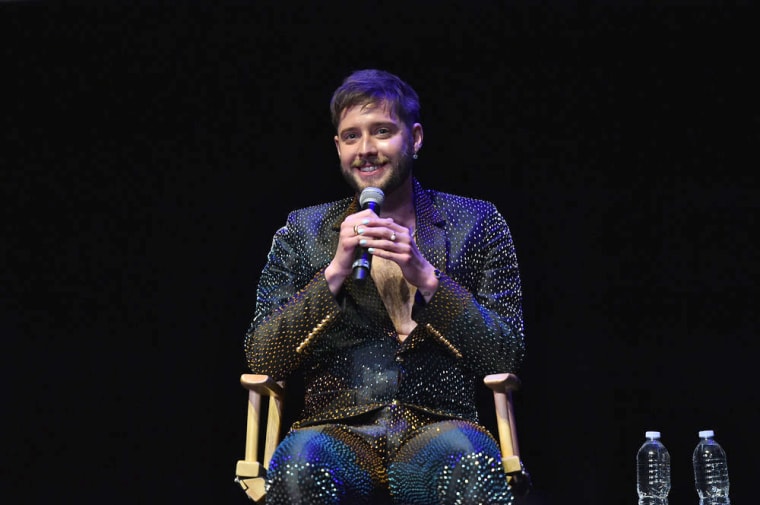
Trauma and tragedy are, unfortunately, inextricably “linked to the queer experience in America in 2022,” Keitel said, citing violence against the transgender community, a record number of anti-LGBTQ bills and queer people being “labeled as predators and groomers.”
But, she added, it’s also important that queer stories don’t leave out the joy along the “real-life journey that people like these characters go through.”
“I have built my own community of people who lift me up and support me, just like how Ruthie has and all of these characters have,” Keitel said. “You find the joy and moments of celebration with each other.”
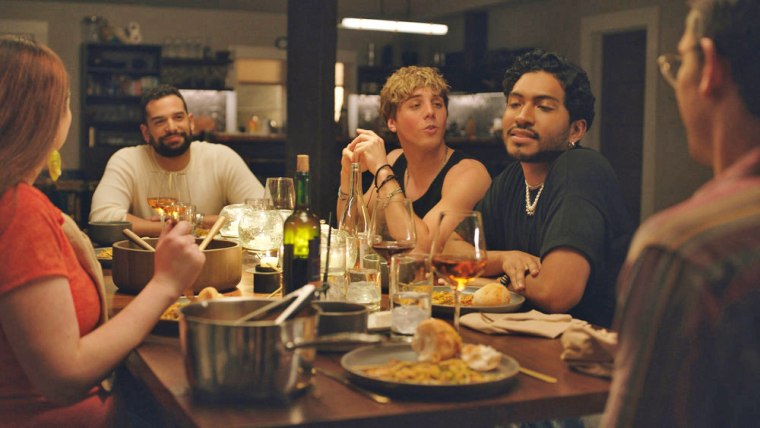
The first two versions of “Queer as Folk” were revolutionary not only in their portrayal of queer friendships and chosen families but also in their unapologetic depictions of gay sex — a legacy that Dunn was also looking to uphold.
“Of course it’s going to be complicated and messy, but I’m really proud of the sex in our show, because it’s hot, liberating, fun, emotional, but there is also often a purpose behind a lot of our sex scenes that I think runs even deeper” and helps to drive the plot forward, Dunn said.
In the second episode, titled “Blocked,” Ruthie has a monologue about feeling disconnected from her body, leading to a liberating sex scene with her partner that Keitel is “endlessly proud of,” because she gets “to show a trans woman’s relationship to her body in a way that isn’t filled with shame.”
“I’ve already had trans people come up to me and say, ‘I’ve never seen a trans body on TV like that and felt so celebrated and so beautiful,’” Keitel said.
The show’s fourth episode, titled “#F--- Disabled People,” was written by Ryan O’Connell, who plays Julian, and centers entirely on a disabled sex party called a “crip rave” that was inspired by Dunn’s friend, Andrew Gurza, a disability advocate based out of Toronto. Dunn said he initially created the character of Julian to “empower members of the disabled community” and to “remind them that they’re not forgotten.”
“One of the things I wanted to do with the show is shed light on members of our community that don’t often get to be seen,” Dunn said. “My one hope is that if there’s one person out there who does feel seen, or feels a little bit less alone after seeing the show — the way that I felt when I first saw the original ‘Queer as Folk’ — then our job is done.”
“Queer as Folk” is now streaming on Peacock.
